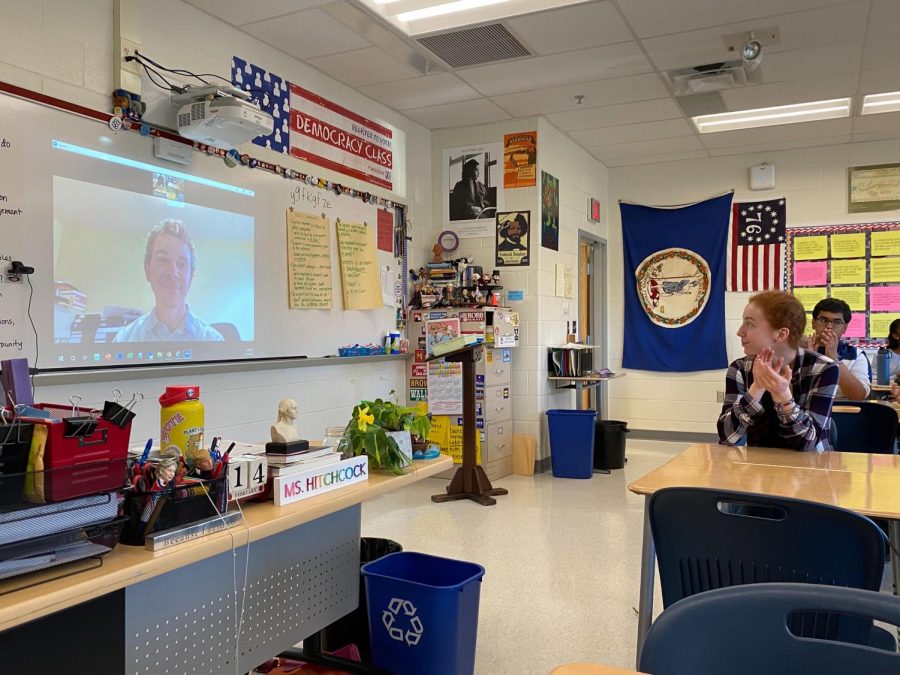AP Government teacher hosts FaceTime call with Juliana vs. U.S. litigant
As the FaceTime session concludes. senior Rayna Schoenberger applauds Nate Bellinger, a litigant for Juliana vs. U.S.
February 28, 2020
On Feb. 14th, AP Government teacher Jennifer Hitchcock hosted a FaceTime call during eighth period with Nate Bellinger, one of the litigants for the Juliana vs. U.S.
Juliana vs. U.S. is a landmark case which argues against the usage of fossil fuels and climate change in the context of the youth plaintiffs’ constitutional rights. Bellinger spent time explaining the basis of case to students unfamiliar with the legal proceedings, and then opened the floor to questions about the case or simply the process of litigation.
“[The case] alleges that the federal government is violating the youth plaintiffs’ – there’s 21 plaintiffs in the case – their constitutional rights to life, liberty and property, and is discriminating against them in violation of the equal protection doctrine, and also is violating the public trust doctrine,” Bellinger said.
The litigants are also arguing for violation of the equal protection clause, which prohibits discrimination against a certain class of people – in this case, the youth.
Bellinger elaborated on several of their arguments: “One is that the government is prioritizing short term economic interests over long term stability of the atmosphere and planet system and natural resource… And medical health and other experts talk about how youth are uniquely vulnerable to the impacts of climate change, by way of the fact that [their] lungs and other organs are still developing and are more susceptible to poor air quality or wildfires, for example,” Bellinger said.
Bellinger also wanted to make their argument clear to the students.
“One point that I want to highlight, because sometimes it’s misconstrued in some of the media coverage of the case, is this is not a lawsuit about government and action on climate change. We are arguing that the government is affirmatively acting to promote fossil fuels through a variety of ways,” Bellinger said.
Bellinger further elaborated on recent developments in the case, including the recent vote of 2-1 to dismiss the case. The legal team found the motion disheartening but the dissenting opinion – the one opposing judge – hopeful.
“They said that is the substantial evidentiary record demonstrates that the federal government has long promoted fossil fuel use, despite knowing that it can cause catastrophic climate change, and that failure to change the existing policy may hasten an environmental apocalypse,” Bellinger said.
This FaceTime call is one of several activities that Hitchcock has organized over the past year to expand interest in government beyond the classroom.
“She actually does a lot of cool activities during lunch and 8th period, but because she’s a new teacher here she doesn’t know how to network it out,” senior Iris Wu said. “So what she does is tell all her kids, and she holds that [hopefully] word of mouth will work.”
In particular, Hitchcock tries hard to expand activism among her students and their participation in government.
“One of the big things that she really tries to bring to her classroom is how young people can make change and getting involved in direct action and staying civically engaged,” Wu said. “That was one of the things that she was really trying to tell us when she brought in the litigants of Juliana, because they have an entire organization that’s dedicated to young people’s cases against the government.”
Wu also found the case to be pertinent, especially for Jefferson students.
“If you look at a lot of us here, research projects around here, we’re all simultaneously working on ways to improve the environment,” Wu said. “So it’s really relevant to a lot of us who are working towards scientific progress and it relates more to young people and how we can personally make a difference in the world.”






